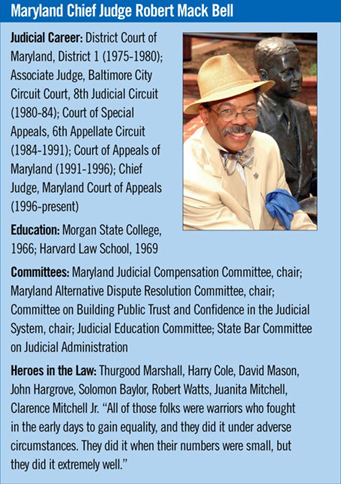Going The Second
Mile (Cont.)
LONG-TERM
COMMITMENT
 Bell’s vote in Frase is
consistent with a career spent promoting public confidence in the
courts and broader access to the justice system. “He is a strong
advocate of the poor, for people that he believes have been
disadvantaged,” Holland says. “If he believes that due process may
not have been done because someone didn’t have a lawyer or a proper
chance to be heard, he’s going to dissent.” Bell’s vote in Frase is
consistent with a career spent promoting public confidence in the
courts and broader access to the justice system. “He is a strong
advocate of the poor, for people that he believes have been
disadvantaged,” Holland says. “If he believes that due process may
not have been done because someone didn’t have a lawyer or a proper
chance to be heard, he’s going to dissent.”
From his very early
days in the law, Bell has evinced a particular sensitivity to the
plight of people passed over by the system. As a young attorney
fresh out of Harvard Law, he went to work for Piper Rudnick, a large
Baltimore firm with strong community-service
credentials.
“When I got to
Piper, the firm had already decided to open a neighborhood office
where pro bono services would be rendered on behalf of those who
could not pay and reduced-fee services to people who could only pay
a small amount,” he says. “They also encouraged young lawyers to go
out into community groups and volunteer to do pro bono
work.”
Bell spent a year
working in the neighborhood clinic, located in the familiar section
of East Baltimore where he had grown up. During his pro bono
rotation, Bell worked frequently with the Legal Aid Bureau in
Baltimore City on landlord-tenant matters, small claims, housing
issues, and consumer-protection cases. Frank Gray, a retired partner
at Piper Rudnick who was in charge of the neighborhood clinic,
recalls, “When [Bell] came he was very interested in working in the
poverty office, learning what these people did and what their
problems were. It was a very satisfying kind of law practice because
this was a community he had known growing up. He had a commitment to
this neighborhood before he ever left high
school.”
Since first donning
a judge’s robe in 1975, Bell has been supportive of Maryland’s
legal services programs. He is not parsimonious with his praise
about the attorneys who toil in local legal aid
offices.
“You’ve got a lot of
dedicated people who stay, not because they’re making the best
living in the world, but because they have the impression that
they’re making a difference,” Bell says. “The amount of effort that
they put into these cases, the amount of expertise that’s amassed
over time, is really extraordinary.” Bell
also finds time to inspire the next generation of leaders. For the
past 30 years, Bell has made hundreds of visits to local colleges
and high schools around the state. It is not uncommon for Bell to
make a half-dozen school visits in a given month in an attempt to
inspire young people to achieve. More often than not, the students
listen to the man in the dapper threads who once made history by
sitting in a restaurant booth and insisting on equal treatment under
the law. This, he hopes, will also be his legacy as a judge. “The
only thing I want to be remembered for,” he says, “is that when I
was Chief Judge, I tried to do whatever I could to improve access to
justice and make equal justice as much of a reality as is humanly
possible. That’s it.”
|